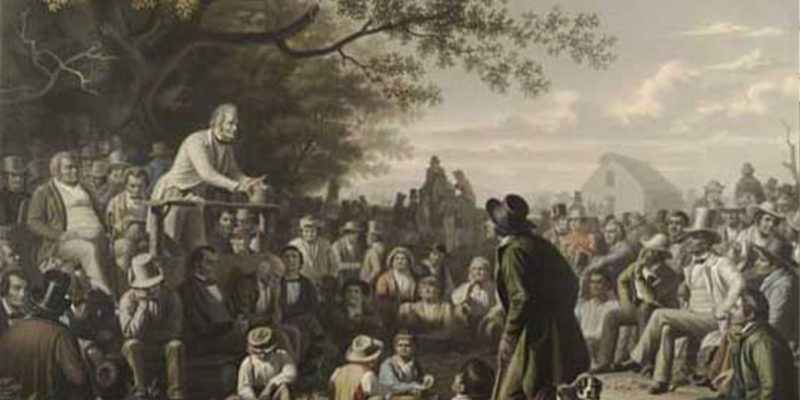Abraham Lincoln’s ascent to power was surprising, but after a deep analysis it is clear that it was not at all unique. Just like Queen Esther, Lincoln was able to overcome extreme odds through patience and faith.
The precise characteristics of “statesmanship” are difficult to articulate because they uniquely manifest themselves in individuals across many different continents over numerous centuries. Despite the fact that each statesman possesses a distinct personality, there are striking, and perhaps instructive, parallels between their actions. The lives of Queen Esther and President Abraham Lincoln illustrate this point. One may assume that the similarities between Esther and Lincoln are limited to their roles as emancipators. In fact, their connection lies much deeper. After exploring their upbringings, political tactics, and religious values the loose resemblance between Esther and Lincoln crystallizes to form a strikingly similar narrative in which their legacies become forever intertwined.
The Book of Esther and the survival of the Jews in Persia is well known. What is less understood are Esther’s origins, “Esther had no father nor mother, and when her father and mother died, Mordecai took her to himself for a daughter,” but her background ends there (Esther 2:7). In other words, Esther was a nobody. She had no family, no apparent noble lineage, and certainly no political aspirations, which is what makes her ascent to Queen of Persia, the ancient world’s lone super power, even more intriguing.
When Vashti, the wife of King Xerxes, fell out of favor with her husband, the King desired a new queen. The selection process for a new queen was similar to that of a beauty contest. Esther was asked to partake in this competition, but Mordecai insisted throughout the selection process that Esther should never reveal her true identity (Esther 2:20). Ultimately, Esther found “favor in the eyes of Xerxes,” and the girl from nowhere was suddenly elevated to queen of Persia. From the heights of the royal palace, Esther was poised to execute an undercover political operation that could save the Jews from extermination (Esther 2:17).
Abraham Lincoln was not born into a prominent family either. On the contrary, Lincoln was the son of an undistinguished man, Thomas Lincoln. Henry C. Whitney, a friend of Abraham Lincoln, said that Lincoln “inherited only ‘infancy, ignorance and indigence,’” from his father (Herndon 1870). Moreover, there is evidence to suggest Thomas Lincoln’s “cold inhumane treatment of him [Abraham]” was ultimately a factor that drove Lincoln from home (Herndon 1870). Little is known about Abraham’s mother, Nancy, because she died when he was just nine years old. In sum, Michael Burlingame explains that Abraham Lincoln was painfully aware of his humble origins:
Lincoln was ashamed not only of his family background but also of the poverty in which he grew up. When John Locke Scripps interviewed him in 1860, Lincoln expressed reluctance “to communicate the homely facts and incidents of his early life. He seemed to be painfully impressed with the extreme poverty of his early surroundings—the utter absence of all romantic and heroic elements,” and even questioned the proposal to have a biography written. “Why Scripps,” said Lincoln, “it is a great piece of folly to attempt to make anything out of my early life. It can all be condensed into a single sentence, and that sentence you will find in Gray’s Elegy; ‘The short and simple annals of the poor.’ That’s my life, and that’s all you or any one else can make of it” (Burlingame 2008)
When Lincoln left his home, he went to study English grammar in New Salem and then went to law school. After a rocky courtship, Lincoln married Mary Todd in what seemed like an extremely unlikely match. Hendon called it a “political match” in which Lincoln hoped to leverage her “family’s power” as notables in the Whig party (Lincoln 1843). Eventually, Lincoln started his political career and unexpectedly became President. Despite Esther and Lincoln’s troubled origins, they were still able to rise to positions of great prestige.
Now that we have discussed several critical biographical similarities between Esther and Lincoln the similarities between their political achievements are even more striking. In the story of Esther, Haman, the second in command to Xerxes, issued a decree stating that all the Jews of the Persian Empire should be destroyed. Until then, Esther had successfully maintained her secret of being a Jew, and she was therefore in a unique position to reveal this to King Xerxes and save her people. However, making a request to the King was not so simple. Xerxes had sequestered himself to a private chamber, and unless the King raised his scepter and requested visitors, anyone who entered would be killed.
Esther was in quite the predicament. On one hand, Esther needed to act fast or else the Jews would be killed in only a few days. On the other hand, if Esther barged into the king’s quarters she would be beheaded. After three days of contemplation, Esther mustered up the courage to enter the king’s chambers where she was met with a smile. Xerxes told her that he would grant any request no matter what it was. In that moment, instead of asking Xerxes to save the Jewish people, Esther mysteriously used this opportunity to invite the king to a banquet. The question is obvious: why would Esther squander this opportunity and delay her request when she was gifted this perfect chance?
Rabbi David Fohrman (2011) explains that Esther couldn’t make the request now for several reasons. First, Fohrman explains that a moral argument would have failed to sway Xerxes because he didn’t govern based on morality. It is doubtful that a King that so nonchalantly
allowed the genocide of a nation would now reconsider his decision in light of Esther’s request. Additionally, Esther couldn’t simply admit that she was Jewish and did not want her people killed. Xerxes would be rightfully mad if Esther were to admit that she had deceived him about her faith the whole time they were married. Therefore, Esther had to employ a much more clever plan.
Esther inserted a deliberate ambiguity in her invitation to Xerxes. Specifically, Esther invited both Xerxes and Haman to her banquet and made it unclear which one she was making it for, “Let the King and Haman come today to a banquet I have made for him” (Esther 5:4). Who did she refer to when she used the pronoun him? Xerxes wondered the same thing, and as the party went on he began to suspect that Haman was having an affair with Esther. Now that the scene was set, Esther pleaded with the king, “If I have found favor in the king’s eyes, and if it pleases the king, then me my life as my request, and the life of my people as my petition. For me and my people have been sold, to be destroyed, killed and annihilated” (Esther 7:3-4). The King demanded to know who would dare devise such a terrible plan, to which Esther responded, “A man who is a treacherous enemy: Haman this evil one” (Esther 7:6). It was only after Xerxes developed a personal vendetta against Haman that he would heed Esther’s request. Ultimately, Xerxes tore up the decree and had Haman killed. Despite the tremendous risk, Esther patiently waited for her plan to unfold, and that is why it worked (Fohrman 2011).
Just as one wonders why Esther waited so long to ask King Xerxes to save the Jews, one may wonder why Lincoln took so long to emancipate the slaves. Lincoln was unequivocal about his disdain towards slavery, yet the Emancipation Proclamation was only implemented two years after he began his presidency. Lincoln, like Esther, knew that he needed to plan meticulously in order to be effective. Lincoln knew that he never would have been elected if he declared his intention to emancipate the slaves during his campaign for the presidency. Furthermore, the legality of emancipation was not so simple. Lincoln actually believed that it wasn’t within his constitutional right to emancipate the slaves without either a change in the law or military necessity. As the nation began to fall apart, Lincoln decided that it was his responsibility to issue the proclamation in order to save the Union.
During Lincoln’s address to Congress he stated that “the dogmas of the quiet past are inadequate to the stormy present”; that the American people need to “disenthrall” themselves; and that “we can not escape history.” Lincoln meant, that up until this point, the country was able to prosper because of its principles. However, the norms and principles that helped America progress could no longer support the country. Therefore, the nation must “disenthrall” itself from those previous standards and adapt. The Union must come up with a new way to maintain its success. The daunting aspect was that America “can not escape history.” Lincoln was in a sense threatening the nation and telling them that they were going to be remembered forever, whether they “succeeded or failed.” And therefore, he concluded his speech by stating that, “We know how to save the Union. The world knows we do know how to save it. We, even we here, hold the power and bear the responsibility. In giving freedom to the slave we assure freedom to the free—honorable alike in what we give and what we preserve. We shall nobly save or meanly lose the last best hope of earth” (Lincoln 1862). Lincoln, like Esther, took a major political risk to save his nation, and although he won the war, this policy ultimately cost him his life.
There are two religious themes that played major roles in some of the challenges that both Lincoln and Esther faced. During Lincoln’s Second Inaugural Address, he said that, “I claim not to have controlled events. G-d alone can claim it.” At the end of the same paragraph, Lincoln solemnly says that “the war came.” Lincoln suggests that it is as if providential forces brought the Civil War and aided the Union in eliminating slavery (Lincoln 1865). Ultimately, those same providential forces allowed Lincoln to win the war, but he was just acting as a messenger of God. While Esther was hesitant to make her request to King Xerxes to save the Jews, Mordecai explained to her that, “For if you remain silent at this time, relief and rescue will arise for the Jews from elsewhere” (Esther 4:14). The logic Mordecai used was the same logic that Lincoln used as an emancipator. There is great risk in taking action, and still God will work through us to save us. The only question was, would it be through Esther and Lincoln or someone else.
Less than two weeks before the Emancipation Proclamation would be issued, Abraham Lincoln was greeted by Rev. William Weston Patton. Patton, who thought slavery was profane, quoted the Book of Esther to Lincoln and described the verses in which Mordecai told Esther to seize her moment and to petition the King. Patton then went on to compare Lincoln’s situation to hers, “[We] believe that in Divine Providence you have been called to the Presidency to speak the word of justice and authority which shall free the bondman and save the nation” (Patton 1888). Lincoln responded to Patton by saying that “Whatever shall appear to be God’s will I will do” (Patton 1888). Lincoln with his vast biblical knowledge was surely echoing Queen Esther in her response to Mordecai, as she said to him, “I will go to the king, though it is against the law; and if I perish, I perish” (Esther 4:16).
In conclusion, the parallels between Queen Esther and President Lincoln as manifested by their personal lives and political careers are striking. Each grew up in imperfect homes, and yet managed to ascend to great positions of power. Esther and Lincoln risked their lives when faced with their own unique political dilemmas, and they relied on their own immense forethought, fortitude, and faith to succeed. Whether Lincoln consciously sought to emulate Queen Esther will never be conclusively known, but behind every challenge that Lincoln faced, Esther hid.
Works Cited
Abraham Lincoln to Martin S. Morris, Springfield, 26 Mar. 1843, CWL, 1:320.
Book of Esther
Burlingame, Michael. 2008. Abraham Lincoln: A Life. Baltimore, MD: Johns Hopkins University Press.
Fohrman, David. 2011. The Queen You Thought You Knew. New York, NY: OU Press.
Lincoln, Abraham. 1865. “Second Inaugural Address.” Teaching American History, Documents, March 4, 1865. https://teachingamericanhistory.org/library/document/second-inaugural-address-1865-2/.
———-. 1862. “Annual Message to Congress.” Abraham Lincoln Online, Speeches and Writings, December 1, 1862. https://www.abrahamlincolnonline.org/lincoln/speeches/congress.htm.
Patton, William Weston. 1888. President Lincoln and the Chicago Memorial on Emancipation: A Paper Read Before the Maryland Historical Society, December 12th, 1887. Baltimore, MD: John Murphy & Co.
William H. Herndon to Ward Hill Lamon, Springfield, 25 Feb. 1870, Lamon Papers, CSmH.




 Compass is an online journal that provides a space for the work of talented undergraduates who have original and well-articulated insights on important ideas and issues relating to American democracy understood in the broad contexts of political philosophy, history, literature, economics, and culture.
Compass is an online journal that provides a space for the work of talented undergraduates who have original and well-articulated insights on important ideas and issues relating to American democracy understood in the broad contexts of political philosophy, history, literature, economics, and culture.